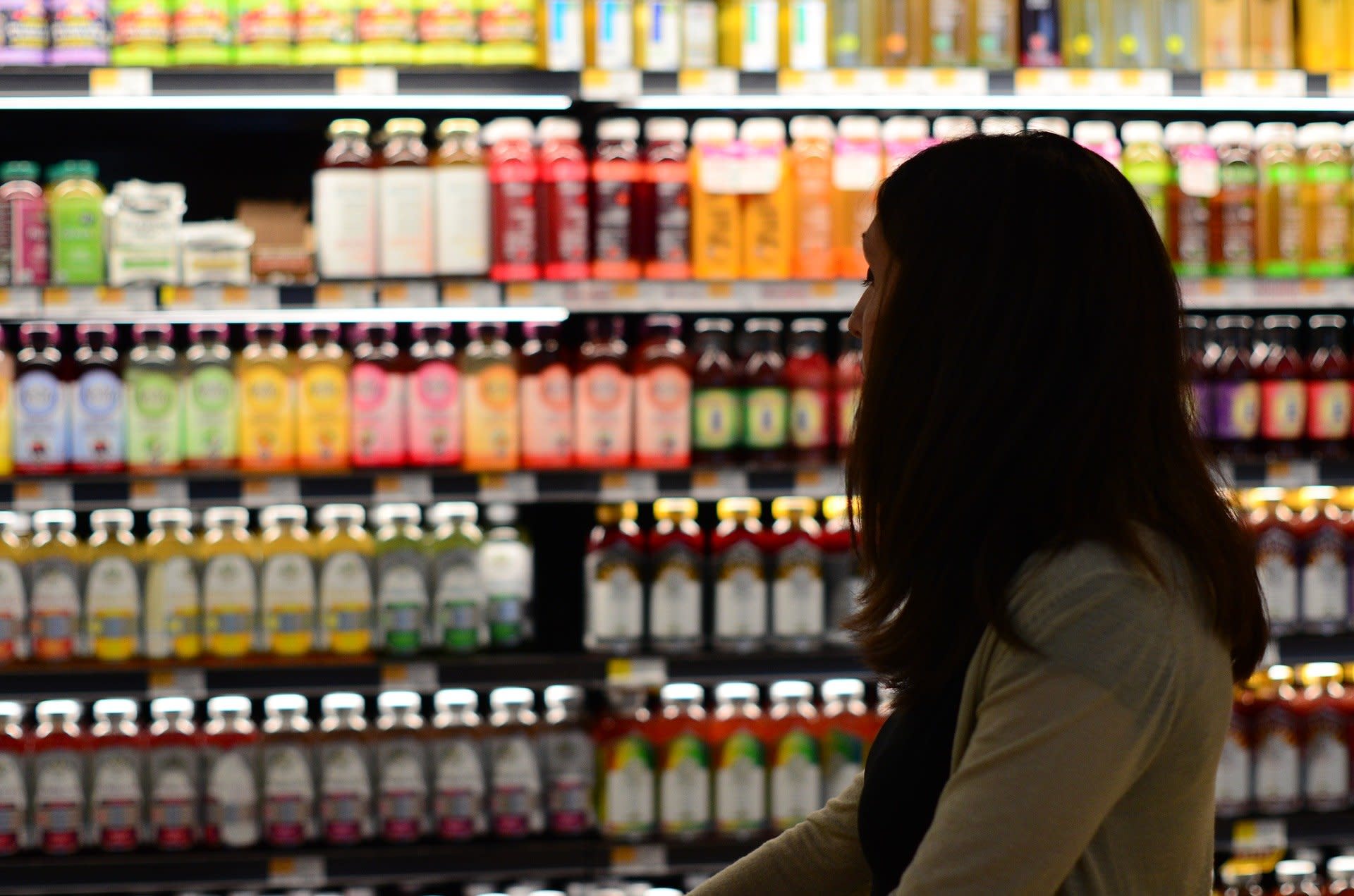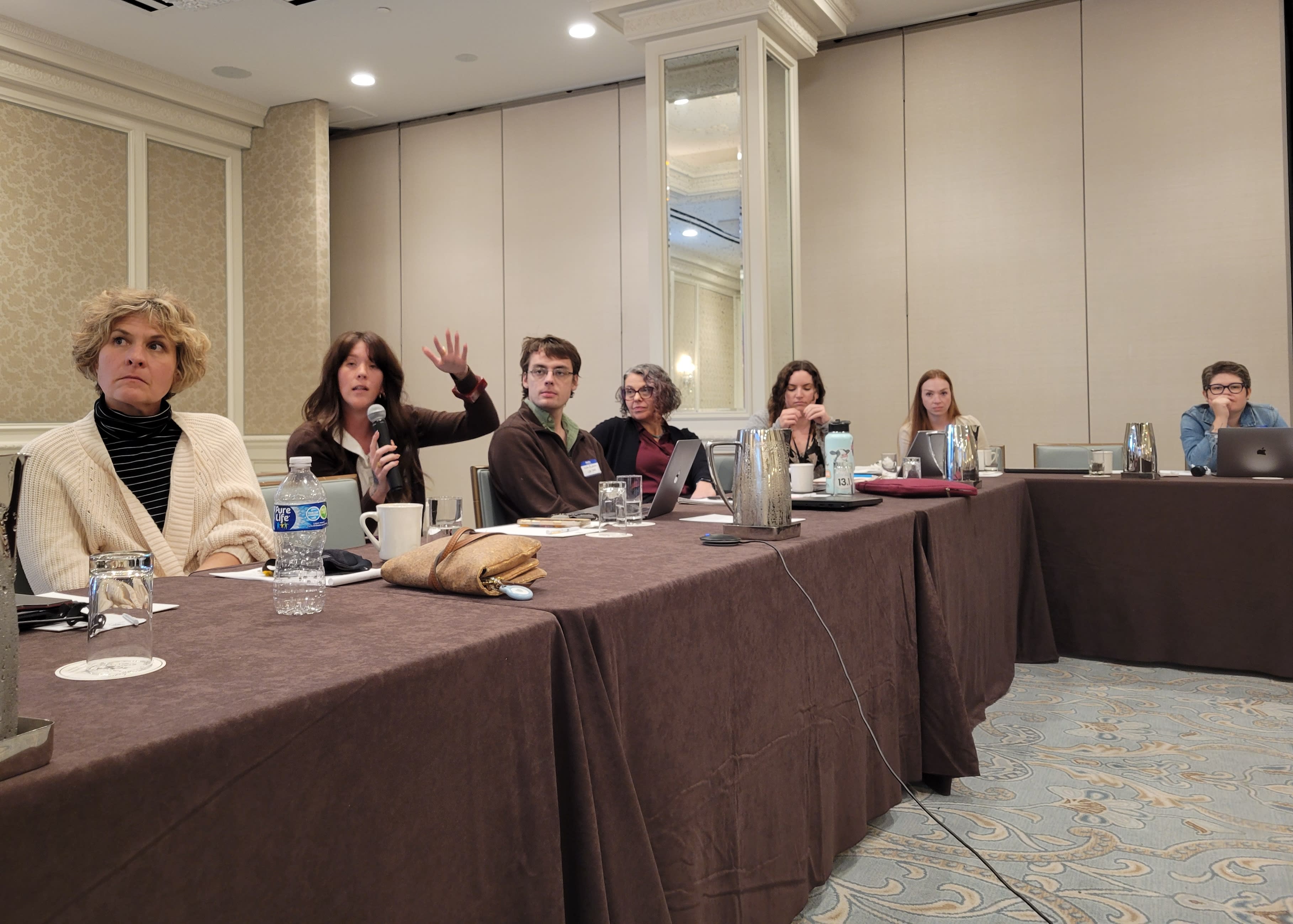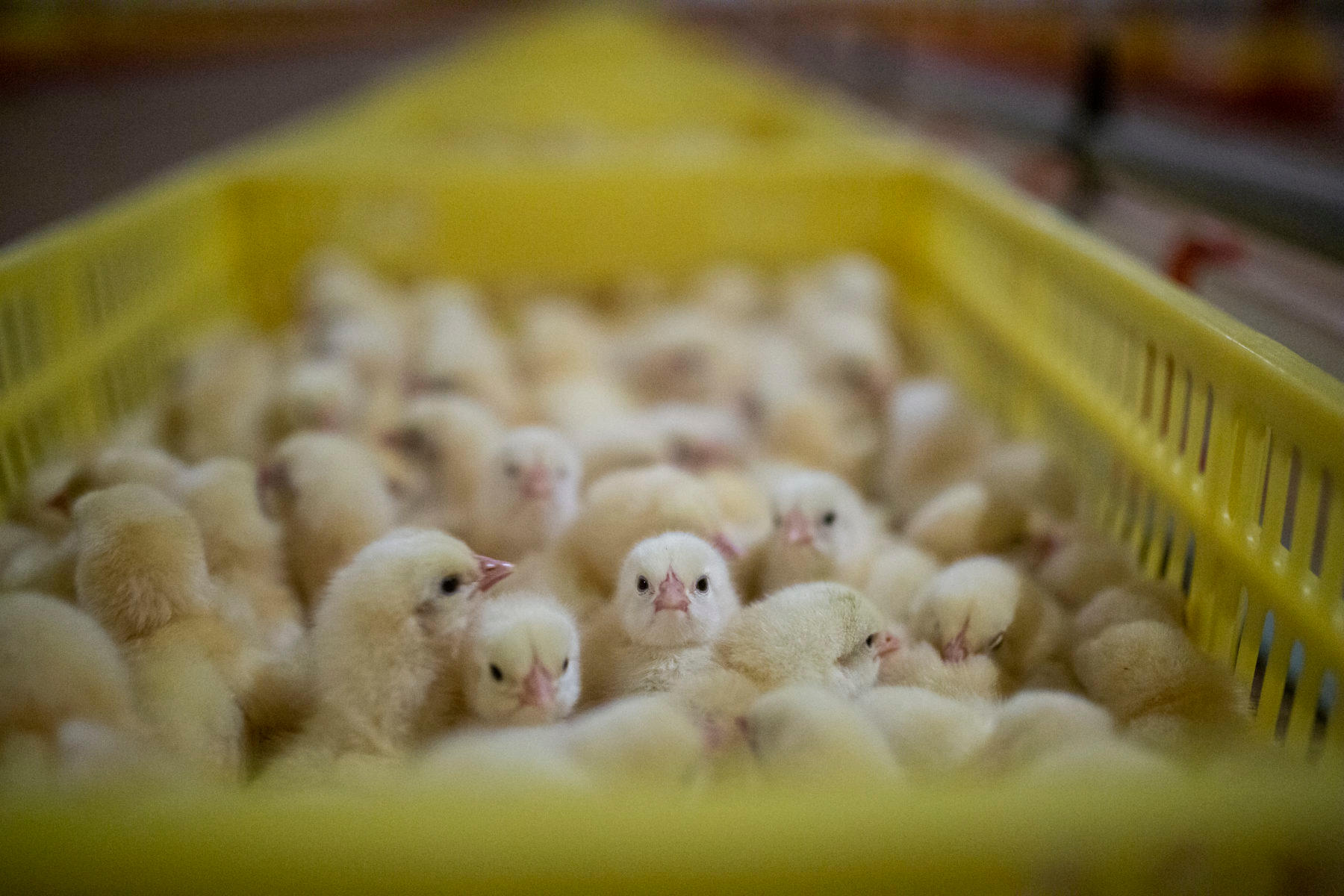




A small group of enormous companies control practically everything we eat and drink.

Walking into any standard supermarket, most people tend to feel immediately overwhelmed by the seemingly endless options towering over them in the aisles ahead. As we slowly chip away at our grocery lists—inundated by the sheer number of different brands to choose from—it can be surprising to remember that nearly everything in that store is owned by just a few huge companies.
Thanks to the power of branding and marketing, many shoppers may never suspect that the microwavable oatmeal they bought, as well as the tortilla chips, orange juice, pancake mix, hummus, and six-pack of soda—all sold under different brand names—originated from the same corporate owner.
Consumer watchdogs refer to this monopolization of the food industry as "Big Food," a small but powerful group of wealthy companies that control the things people eat all over the world.
What is Big Food?
"Big Food" refers to the handful of multinational corporations that own the vast majority of foods and drinks we consume. Similar to Big Tobacco, Big Oil, or Big Agriculture, a small handful of Big Food companies dominate the market and use their wealth and influence to control the way the government regulates their industry.
For example, when we think of the names "Pepsi" and "Coca-Cola," most people's minds go straight to the sweet sugary soft drinks both companies sell—but that's just the tip of the iceberg. Beneath the umbrella of those two companies alone, we find brands like Gatorade, Dasani, Tostitos, Doritos, Fresca, Simply Orange Juice, Sprite, Barq's Root Beer, Quaker Oats, and many more.
How do I recognize a Big Food brand versus a smaller one?
In general, if a product has a name you can remember seeing or hearing all your life, or if it's something that you can buy in grocery stores anywhere throughout the country, those are easy giveaways that the brand belongs to a Big Food corporation. A smaller, local, or independently owned brand will be less recognizable and will likely only be sold within a specific geographic radius.
Sometimes it requires a bit more detective work, but by looking more closely at the labels of the food products in the store, you can usually find out the name of the larger corporation that owns the product you're holding.
What are Big Food companies called?
-
Associated British Foods: Based in the UK, with operations spread across six continents and 53 countries, Associated British Foods (ABF) owns popular brands like Twinings Tea and Mazola. This global company has control over multiple steps in the food supply chain, owning animal feed manufacturers, multiple sugar and spice businesses, and a plethora of brands on grocery store shelves all over the world.
-
Coca-Cola: One of the most recognizable companies throughout the globe, the Coca-Cola Company doesn't just sell soda. Vitamin Water, Minute Maid, Peace Tea, Fairlife, Powerade, Topo-Chico, and many more drinks fall under the Coke umbrella.
-
Danone: U.S. consumers recognize this company as "Dannon"—a deliberate choice to make the company's name sound more American. Danone is actually a French multinational corporation, and one of the top producers of dairy products, bottled water, plant-based foods, and specialized nutritional products in the world.
-
General Mills: General Mills has a strong foothold in the breakfast food market, owning cereals like Chex, Cheerios, Cinnamon Toast Crunch, and Cocoa Puffs. It also owns snack foods, pet products, and baked goods.
-
Kellogg's: Another mainstay of morning meals, Kellogg's is well known for cereals like Apple Jacks and Frosted Flakes. It also owns plant-based alternatives to meat like Morning Star, Incogmeato, and Gardenburger.
-
Kraft Heinz: Following a 2015 merger, Kraft and Heinz combined operations to become one of the biggest food companies in the world. Between them, Kraft Heinz now most of the staples of a typical packed school lunch: Oscar Mayer, Lunchables, Jell-O, Capri-Sun, and Kool-Aid.
-
Mars: There's a good chance your favorite candy or chewing gum is a Mars brand. Starburst, Skittles, M&M's, Snickers, Twix, Milky Way, Dove, Altoids, 5 Gum, Lifesavers, and Orbit are just some of the products that make the Mars family the third richest in the United States.
-
Mondelez: Snack foods owned by the massive Mondelez conglomerate are currently sitting in pantries and convenient store shelves in more than 150 countries throughout the world. Oreos, Wheat Thins, Triscuits, and Ritz are some of the corporation's most successful brands in the U.S.
-
Nestlé: The Nestlé Company has a notably diversified portfolio, with products encompassing candy, snack food, dairy drinks, coffee, baby food, pet food, and bottled water.
-
Pepsico: Making a name for itself with soft drinks like Pepsi, Mountain Dew, Tropicana, and Gatorade, Pepsico also owns an array of (mostly rhyming) snack foods like Tostitos, Doritos, Fritos, and Cheetos.
-
Unilever: Founded by a family of carpenters who got into the butter trade around the mid-1800s, Unilever's influence reaches beyond the grocery aisles. In addition to finding its products in your fridge and freezer (Hellman's Mayonnaise, Ben & Jerry's Ice Cream), you're also likely to find some in your bathroom (Axe, Dove, Rexona), or beneath the sink (Seventh Generation, Persil, Cif).
Who owns Big Food companies?
The question of who owns a Big Food company depends on the individual corporation in question. Many transnational groups are "publicly traded," meaning that no single person owns the company. Instead, ownership is shared among many, many shareholders and investors. The Coca-Cola Company, for example, is one such public company whose ownership is shared among thousands of investors around the world. Warren Buffet, the famous billionaire investor, currently owns the largest share of Coca-Cola.
Other Big Food companies, however, are privately owned. Notably, to this day the Mars family has maintained sole ownership of Mars Inc, making it one of the largest privately owned companies in the U.S.
What are the goals of the Big Food industry?
As in any industry, Big Food corporations ultimately share one goal: to maximize profits. There are a few key factors that create a fertile environment for these transnational giants to make as much money as possible: monopolize the industry, control as much of the supply chain as possible, and maximize efficiency.
Monopolization of the food sector
A 2021 analysis by The Guardian and Food and Water Watch found that a handful of companies control the majority market share of almost 80% of the groceries Americans buy. Looking at anything from cereal and breakfast pastries, to chips and dip, to soda and energy drinks, to meat and other animal products, the study found that, in most cases, just four corporations, if not fewer, dominated the majority of the market.
"It's widely agreed that consumers, farmers, small food companies and the planet lose out if the top four firms control 40% or more of total sales," according to the researchers.
Control of the supply chain
It's not enough for Big Food companies to own the majority of products sitting on our grocery shelves. They can make even more money through a process sometimes known as "vertical integration."
By controlling every link in the supply chain—animal feed, seeds, fertilizer, delivery vehicles, processing plants, and the final products—a small group of powerful corporations have unchecked power to pay laborers less, charge consumers more, and watch their own profits soar.
Maximization of efficiency
When it comes to investing the least amount of money to generate the most possible revenue, Big Food and Big Agriculture go hand-in-hand. Big Food relies on factory farms, also known as concentrated animal feeding operations, which force animals to live in inhumanely crowded, squalid, unnatural conditions so that they grow quickly and cheaply to be slaughtered and used in meat products. Perhaps this is an efficient strategy for corporate shareholders, but it comes at the expense of countless animals' suffering, environmental degradation, and declining public health.
Why is the Big Food industry bad?
Environmental degradation
The daily operations of Big Food and Big Ag have several profound impacts on the environment:
-
Pollution: Factory farms degrade the air quality of the communities where they are located. According to the CDC, ammonia, hydrogen sulfide, and methane are the most typical pollutants in the air surrounding industrial-sized farms. Most troubling of the three, perhaps, is the emission of methane, a super powerful greenhouse gas—80 times more potent at warming the atmosphere than CO2.
-
Depletion of resources: Large-scale farming requires a huge amount of resources. According to the International Water Management Institute, agriculture accounts for 70 percent of global water withdrawals. And meat production has a far bigger water footprint than fruits and vegetables do. It takes roughly 1,847 gallons of water to produce just one pound of beef! That's enough water to produce nearly 50 pounds of veggies, or 16 pounds of fruit.
-
Population disruption: Farms can prove devastating to the natural wildlife in the surrounding area. For example, farmers might use a pesticide to stop pests from harming their crops, unintentionally decimating, "non-target" pollinator populations. In addition, the huge water withdrawals that industrial farms use to feed crops can upset the area's ecosystem, wreaking havoc on native fish, birds, and reptiles who rely on that water for survival.
Animal welfare
As far as the leaders of the food and agricultural industry are concerned, the welfare of the animals raised for poultry, pork, dairy, and beef is not a priority. Animals on factory farms are subjected to a host of cruelties: overcrowding, forced impregnation practices, deformities, disease, surgical procedures with no anesthetic, and many more. The scientific community has come to a clear consensus that farm animals—like chickens, pigs, and cows—are far more intelligent and emotionally aware than we once believed. They deserve to be treated with kindness and respect—instead, factory farms force them to endure a lifetime of suffering.
Government lobbying
Big Food spends a fortune on lobbyists whose job is to influence elected officials to keep government oversight of the industry at a minimum. During the 2020 election cycle, Big Food spent $175 million on political contributions and lobbying efforts. That's six times higher than the amount the industry spent during the 1992 election cycle, highlighting just how successfully corporations have consolidated power.
Lack of corporate accountability
In March of 2021, UK charity organization Oxfam—whose mission is to fight global inequality—published a report documenting whether Big Food corporations had made good on their commitments to women's empowerment, climate change, and land rights. The report concluded that while companies made some progress in these categories, the industry had not done enough to reverse its deeply entrenched inequalities.
Throughout the years observed, the food supply chain became even more consolidated, preventing poorer farmers and laborers involved in food production from getting their fair share, and leaving their communities more vulnerable to natural disasters as a result of climate change.
"A more resilient global food system requires urgent, systemic change," the report reads. "We must make progress on the systemic drivers of this inequality to protect the only planet we have and to ensure that small-scale farmers and workers get their fair share of the value they create."
Public health issues
Thanks to the consolidation of the Big Food industry and relatively weak government oversight, corporations in the United States have much freer reign to use ingredients and chemicals that are not permitted elsewhere in the world. Ingredients that have been linked to cancer—including some that the European Union has banned entirely—still show up on plenty of products currently sitting on store shelves in the United States.
Due to a blatant overuse of antibiotics on animals raised for meat, factory farms and Big Food is also making us more susceptible to antibiotic-resistant infections and diseases.
How we can stop the Big Food industry
Buying local
Buying locally sourced food is one of the most effective ways to ensure that your money is going to directly to help out the farmers and workers who grew your food; not a huge corporation. Check out this state-by-state resource list to find out how and where you can get locally grown food in your community.
Read labels at the supermarket
Most people like to get into the supermarket and get their shopping done as quickly as possible. But for the sake of your own health, the state of the planet, and the support of local, ethical farmers, it's a great idea to take the time to read product labels before you purchase groceries. Once you know which corporations you want to avoid supporting—or which ingredients you don't want to consume—it'll get easier and easier every time you shop. Here are some helpful hints to get started.
Vegan and vegetarian diets
Switching to plant-based, vegan, or vegetarian is a tangible solution to many of the problems caused by Big Food. Veganism and vegetarianism avoid supporting animal cruelty, contribute far less to climate change than eating meat, promote a healthier lifestyle, and make it simpler to purchase foods from local producers.
Documentaries and resources to learn more about Big Food
The bottom line
Late in 2019, Politico published an article boldly proclaiming that the "era of 'Big Food' is over in Washington." Due to consumers demanding better transparency about where their food comes from and what it's made with, huge companies, once unified in their collective mission, were fracturing over disagreements on how to best meet these consumer demands.
Considering the level to which the food supply chain remains controlled by so few, and considering how much money the industry pumps into American politics every year, it seems like quite a stretch to think that the era of Big Food is truly "over"—but, there's hope on the horizon.
When enough consumers join together and call for more transparency, equality, and sustainability, corporations notice. If you are unhappy with the animal cruelty perpetrated by Big Food, or uneasy about the unregulated ingredients in your foods, or worried about the impact your diet has on climate change, making the switch to a plant-based diet is a great first step to putting Big Food in its place.
Click here for tips on how to get started on going vegan and be the change for animals today!





